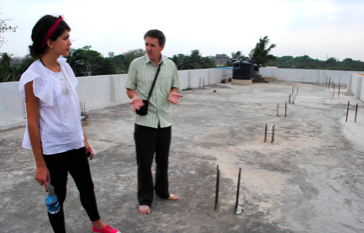If you’re the smartest person in the room, you’re in the wrong room
By: Jacqueline Herrera, Co-founder and Director
Last week, I received an email that included the following:
“Looking at the number of batteries, 8 at 12 volt, they could have designed this as 8 strings at 12 volts, 4 strings at 24 volt or 2 strings at 48 volt. The last would be best, as three strings is generally the limit for good performance and 2 is better. The 16 solar panels at 120 watts to stay within the 120 amp limit of the two 60 amp rated charge controllers mean the system is most likely designed to be 24 or 48 volt system.”
I stared at that paragraph and re-read it maybe around 8 times, trying to follow the numbers and volts and watts and see how they were actually related, but it was all Greek to me. One of the coolest parts of my job is the amazing knowledge I gain when researching and structuring our projects on the ground. One day I’m looking up the life cycle of a Tilapia, another day I’m researching virus and disease in tomatoes, and the next could be propagation of water born illnesses in unmaintained wells. Some of the stuff is random, but it’s all fascinating and challenging.

Kitechild Co-Founder assessing the situation for a potential project in Bapatla, India
Books, Google, and research papers aren’t enough though. After we had a setback in one of our solar projects in Liberia, due to our lack of understanding the principles of such an installation when it came down to troubleshooting, I knew we needed to be more prepared for the next time. So I called in the big guns: Engineers Without Borders. You may have heard of a similar organization, the prestigious Doctors Without Borders/Medecins Sans Frontiers. Engineers Without Borders works in the same way – expert, knowledgeable leaders in the engineering field volunteer their time and expertise to underdeveloped communities and small NGOs needing assistance with technical projects. With our new partnership, they have so far provided much needed insight on our issues in Liberia, and expert guidance on a new solar installation in Kenya.

Source: Engineers Without Borders USA
There is a saying that states “if you’re the smartest person in the room, you’re in the wrong room”. At Kitechild, we are always learning about new ways to help communities care for their vulnerable children. The work itself is rewarding, but we can always learn more from others. It is amazing to see how other people are doing their part to do good in the world by sharing their knowledge, time, and expertise to others. Whether that is engineering, medicine, teaching, etc. you never know how your job could one day do so much to improve the lives of others. There is always something more to learn, and keeping that door open and welcoming the insight of others is a crucial savvy move for any company or organization. We are very excited about this partnership and look forward to it benefitting the outcomes of our projects. Check out www.ewb-usa.org for more information.
Other Blogs
#TBT! Check out this video from our first little fundraiser we did back in 2010! We all have to start somewhere, and this is a great example of the ways YOU can be a Kitechild ambassador – hosting small get togethers in the community, donating a birthday, etc. are all great ideas! To get started, […]
Read MoreYou’ve had your black Friday, small business Saturday, and cyber Monday, now it’s Giving Tuesday, an official UN recognized day to give back amidst all the recent material frenzy. You can donate a cow for our recent farm project in Kenya, a water filter, or the gift of education for our kids in India. We […]
Read More

